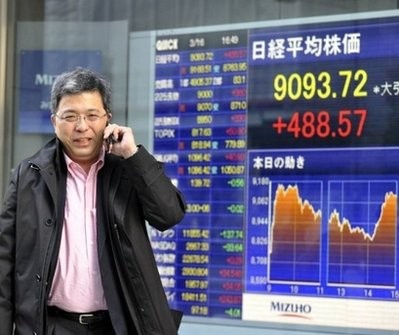OSAKA (AFP) – Tokyo stocks surged more than 4.0 percent Tuesday, helped by signs of progress in containing Japan's post-quake nuclear crisis and as the Bank of Japan pumped nearly $25 billion more into the market.
But dealers warned any fragile optimism would quickly erode on signs of a setback in the delicate operations to restore power to overheating reactors at the Fukushima atomic plant, which was crippled by a March 11 quake and tsunami.

The yen was steady after Japan and its G7 allies on Friday intervened jointly in currency markets for the first time in a decade to calm turmoil sparked by the country's worst natural disaster in nearly a century.
Japanese stocks extended Friday's bounce as investors returned from a long weekend. Monday was a public holiday.
"Foreign investors were completely thrown off by Japan's nuclear power plant problems but there is still room for them to buy back the undervalued shares," said Masayoshi Yano, a senior market analyst at Meiwa Securities.
The key Nikkei share index closed 4.36 percent higher, adding 401.57 points to 9,608.32. The broader Topix index added 4.54 percent, or 37.74 points, to 868.13.
Sentiment was boosted after the central bank on Tuesday injected two trillion yen ($24.67 billion) into the money market as it continued an aggressive emergency fund operation following the earthquake and tsunami.
It has now injected a total of 39 trillion yen in such funds to ease concerns about the ability of financial institutions to meet spiking demand for funds, particularly those in quake-hit areas.
Emergency teams, meanwhile, managed to establish a link to an external power source at the crippled nuclear plant and pour more water on its overheating reactors as they raced to restore key cooling systems.
Tokyo on Tuesday threatened a further yen-selling intervention by the Group of Seven leading industrialised nations, saying joint action was not limited to last week's coordinated move.
The comments reinforced caution among players that if they push up the yen too sharply and quickly, Japanese authorities may move to push it down with the possible backing of other G7 countries, dealers said.
Friday's moves by Japanese, US, eurozone, Canadian and British monetary authorities to take concerted action pushed down the yen from the post World War II dollar high it struck following the twin natural disasters.
It also demonstrated international sympathy for Japan's plight, as volatile currency movements threaten its crucial export sector. A strong yen makes goods more expensive overseas and erodes companies' repatriated profits.
Last week the greenback had tumbled below 77 yen, a move Tokyo blamed on speculators betting on an influx of capital by Japanese companies to aid reconstruction efforts.
Tokyo stocks endured a 16 percent two-day sell-off last week, as nuclear fears compounded worries over the quake's impact on the economy.
Around 22,000 people are confirmed dead or listed as missing in Japan.
The devastating quake and tsunami plunged the nation into what Prime Minister Naoto Kan has called its worst crisis since World War II, exacerbated by the nuclear emergency.
Infrastructure along the northeast coast has been shattered while leading companies such as Toyota and Sony shuttered plants amid rolling power outages, hitting output.
Exports of key components and crucial equipment used in the assembly of goods abroad, such as silicon wafers, liquid-crystal displays and electric machinery, have been hit sending shockwaves across global markets.
A mammoth rebuilding task will be required after a disaster whose economic impact is expected to be worse than that from the 1995 Kobe earthquake, which killed 6,400 people.
"The Japanese economy as a whole managed to shrug off the impact of the Kobe earthquake in 1995," said Capital Economics in a research note.
"However, this time it?s different: the recent disaster has had national effects and the blow to confidence could severely curtail any rebound."
Japan also faces food scares with products such as milk, spinach and also tap water indicating abnormal levels in regions around the Fukushima plant.
The disasters could cost Japan up to $235 billion, or 4.0 percent of output, and reconstruction could take five years, the World Bank warned Monday.
























